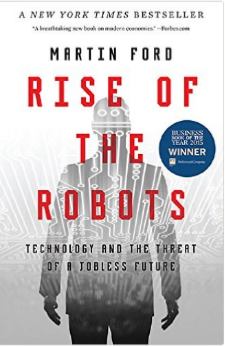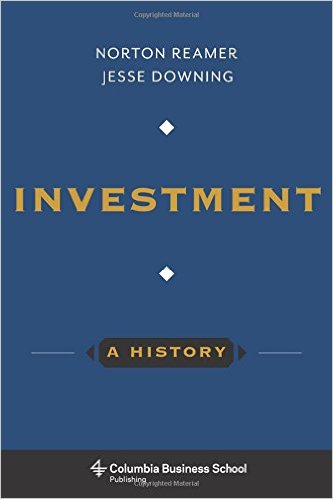Memorial Day weekend is fast approaching. If you are anything like me, you are probably looking forward to delving into several new and recent book releases that could make for pleasant beach reading.
This is the perfect time of year to take advantage of the slower pace, kick back, and learn something new. I managed to cull my list from about 50 to what follows. My goal is to get through at least 10 of them before the leaves start turning color in the fall. Here are the books I hope to finish before then:

1. Rise of the Robots: Technology and the Threat of a Jobless Future by Martin Ford
Given the angst about robots taking jobs from, well, everyone, this 2015 FT & McKinsey Business Book of the Year could not be more timely.
I am interested in machine intelligence, robotics and neural networks, so given the book’s acclaim and great reviews, I expect to find insights into what the future economic implications of these rapidly accelerating technologies will be.
2. Money Changes Everything: How Finance Made Civilization Possible by William N. Goetzmann
Given the myriad problems finance has caused — credit crises, the dot-com collapse, housing booms and busts, commodities crashes, deflation — it is easy to forget how wondrous financial technologies and institutions have made the modern global economy possible. We probably fail to spend adequate time contemplating how such essential economic elements as money, bonds, banks, corporations, etc., evolved into their current forms. This looks like the book that can make that explanation interesting.
It is rare that I would even consider reading a book based on a single blurb, but given my respect for William Bernstein, his did the job: “Only William Goetzmann — an archaeologist, art historian, and esteemed finance scholar — could have produced this masterful exploration of money and investing through the ages. Money Changes Everything is at once deep, broad, sweeping, and gorgeously illustrated. It is a book that readers will savor and refer to again and again.”
 3. Superforecasting: The Art and Science of Prediction by Philip E. Tetlock and Dan Gardner
3. Superforecasting: The Art and Science of Prediction by Philip E. Tetlock and Dan Gardner
I discussed the genesis of my dislike of forecasting last week, but a much more nuanced view comes from University of Pennsylvania professor Philip Tetlock (see our Masters in Business interview). His latest book is less of a critique of forecasting and more of a guide to intelligent decision making. Learning how to think about ways to improve judgment is surely of interest to any investor.
The Economist named this a “Best Book of 2015,” and Jason Zweig of the Wall Street Journal called it “the most important book on decision making since Daniel Kahneman’s ‘Thinking, Fast and Slow.'” I am looking forward to seeing what Tetlock has learned over the course of decades studying the subject.
4. “Phishing for Phools: The Economics of Manipulation and Deception,” by George A. Akerlof and Robert J. Shiller
Perhaps the flip side of better decision making is this question: Why are economic players so easily manipulated and deceived? Written by two Nobel laureates, it explores a radical idea in economics: that markets are not benign places of exchange, but are either positive or negative.
“Phishing for Phools” has won too many awards and accolades to list here. But when narrowing down my list, I noted that Bob Shiller (hear the Masters in Business interview here) co-wrote this — what else do you need to know?
 5. “Investment: A History,” by Norton Reamer and Jesse Downing
5. “Investment: A History,” by Norton Reamer and Jesse Downing
5. I get asked to blurb books all the time, and I mostly pass. There are so many published books I want to read that I don’t have time to sift through the countless unpublished ones. But thumbing through this historical look at the past 4,000 years of investing history, I got sucked in. I was engrossed by the chapter on the emergence of investment theory — it is a tour de force, and that alone was worth the price of admission. I hope to finish this soon.
6. “Sapiens: A Brief History of Humankind,” by Yuval Noah Harari
I mentioned to a friend from South America how much I enjoyed “Last Ape Standing: The Seven-Million-Year Story of How and Why We Survived,” and he gave me “Sapiens” as a follow-up read. It answers a big question: “How did Homo sapiens evolve from an unexceptional savannah-dwelling primate to become the dominant force on the planet, emerging as the lone survivor out of six distinct, competing hominid species?”
The book is a sweeping history of the human species, its violent emergence and eventual planetary domination. Any time a book is called “the most surprising and thought-provoking book I read this year,” you have my full attention.
 7. “Stuff Matters: Exploring the Marvelous Materials That Shape Our Man-Made World,” by Mark Miodownik
7. “Stuff Matters: Exploring the Marvelous Materials That Shape Our Man-Made World,” by Mark Miodownik
I don’t know how I missed this when it came out in 2014: It was the Winner of the Royal Society Winton Prize for Science Books, as well as a New York Times Notable Book of 2014.
This deep dive into materials science is just the sort of pop-physics book that is perfect for consuming with the sounds of waves slapping the beach as your background music. If you are curious as to why glass is see-through, how elastic stretches and returns to its original shape, or why any of the 11 common materials Miodownik looks at behave the way they do — I know I am — then you might share my enthusiasm for this book.
8. “Originals: How Non-Conformists Move the World,” by Adam Grant
Original thinkers are few and far apart. When we find a true original — Grant’s “Give and Take” showed the top-ranked Wharton professor to be one — it is worth paying attention to their ideas. Grant’s latest is a look at how people, especially those outlying nonconformists, drive society’s debates forward, pressing new ideas into the mainstream.
Avoiding groupthink, keeping your biases in check, and thinking deeply about controversial concepts are why this is on my summer reading list. (I was so intrigued by “Give and Take” that Grant is an upcoming guest on Masters in Business.)
 9. “The Gene: An Intimate History,” by Siddhartha Mukherjee
9. “The Gene: An Intimate History,” by Siddhartha Mukherjee
Siddhartha Mukherjee is an assistant professor of medicine at Columbia University Medical Center and a staff cancer physician at NewYork-Presbyterian/Columbia. Given all of the progress being made in genomics as well as oncology, who better to take the reader on a historical review of not only genetics but life itself than the author of Pulitzer Prize-winning book “The Emperor of All Maladies: A Biography of Cancer“?
Mukherjee tries to answer one of the defining questions of our time: What becomes of humanity once we learn to “read” and “write” our own genetic information?
10. “On the Move: A Life,” by Oliver Sacks
I have long been a fan of Sacks’s work; “The Man Who Mistook His Wife For A Hat: And Other Clinical Tales” changed the way many of us looked at how the human brain operates. We often learn more about brain functioning when disease or injury strikes; this book was a huge breakthrough, surprisingly relevant to behavioral economics. Music fans may find “Musicophilia: Tales of Music and the Brain” similarly fascinating.
Sacks not only lived a life worth examining, but the way he handled his own death is similarly filled with lessons. Upon discovering he had terminal liver cancer at age 81, he penned his own farewell op-ed in the New York Times, full of grace and gratitude. We could all learn much from his life and work.
That is my summer reading list for 2016. As I am so fond of asking in my daily reads, what are you reading?
Originally: Your Summer Reading List


What's been said:
Discussions found on the web: